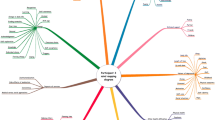Abstract
This study compared perceptions of the causes of, therapies for, and means of coping with, depression between two groups of currently nondepressed adults: one with a history of major depression and one with no history of depression. Currently nondepressed participants were selected so that effects of past experience of depression could be distinguished from those of current mood. Recovered depressed participants (RD) (n = 25) and Never depressed participants (ND) (n = 25) recruited via newspaper advertisements completed self-report measures of (a) the perceived utility of either professional or self-help coping strategies for managing their own experiences of depression; (b) likely effectiveness of several major therapies for depression; and (c) perceived accuracy of several etiological theories of depression. RD participants rated depression as being less amenable to everyday self-help methods of coping and more in need of professional intervention. However, RD and ND subgroups did not differ significantly in their perceptions of the plausibility of etiological theories of depression in general, nor in their ratings of the likely helpfulness of major therapies.
Similar content being viewed by others
REFERENCES
Addis, M. E., & Jacobson, N. S. (1996). Reasons for depression and the process and outcome of cognitive-behavioral psychotherapies. Journal of Consulting and Clinical Psychology, 64, 1417-1424.
American Psychiatric Association (1994). Diagnostic and statistical manual of mental disorders, Fourth Edition. Washington, DC: American Psychiatric Association.
Beck, A. T., Rush, A. J., Shaw, B. F., & Emery, G. (1979). Cognitive therapy of depression. New York: Guilford Press.
Beck, A. T., Steer, R. A., & Garbin, M. C. (1988). Psychometric properties of the Beck Depression Inventory: Twenty-five years of evaluation. Clinical Psychology Review, 5 307-324.
Beck, A. T., Steer, R. A., & Raineri, W. F. (1988). Scale for suicide ideation: Psychometric properties of a self-report version. Journal of Clinical Psychology, 44 499-505.
Cohen, J. (1988). Statistical power analysis for the behavioral sciences (2nd edn.). Hillsdale, NJ: Lawrence Erlbaum.
Coyne, J. C. (1994). Self-reported distress: Analog or ersatz depression? Psychological Bulletin, 116, 29-45.
Feldman, L. A., & Gotlib, I. H. (1993). Social dysfunction. In C. G. Costello (Ed.), Symptoms of depression (pp. 85-112). New York: John Wiley & Sons, Inc.
Fennell, M. J. V., & Teasdale, J. D. (1987). Cognitive therapy for depression: Individual differences and the process of change. Cognitive Therapy and Research, 11, 253-271.
First, M. B., Gibbon, M. G., Spitzer, R. L., & Williams, J. B. W. User's Guide for the Structured Clinical Interview for DSM-IV Axis-I Disorders, (SCID-I, Version 2.0, October 1995 Final Version).
Frank, E., Prien, R. F., Jarrett, R. B., Keller, M. B., Kupfer, D. J., Lavori, P. W., Rush, A. J., & Weissman, M. M. (1991). Conceptualization and rationale for consensus definitions of terms in major depressive disorder. Archives of General Psychiatry, 48, 851-855.
Furnham, A., & Haraldsen, E. (1998). Lay theories of etiology and ‘cure’ for four types of paraphilia: Fetishism; pedophilia; sexual sadism; and voyeurism. Journal of Clinical Psychology, 54, 689-700.
Hallahan, M., & Rosenthal, R. (1996). Statistical power: Concepts, procedures, and applications. Behavior Research and Therapy, 34, 489-499.
Kendall, P. C., Hollon, S. D., Beck, A. T., Hammen, C. L., & Ingram, R. E. (1987). Issues and recommendations regarding use of the Beck Depression Inventory. Cognitive Therapy and Research, 11, 289-299.
Kuyken, W., Brewin, C. R., Power, M. J., & Furnham, A. (1992). Causal beliefs about depression in depressed patients, clinical psychologists and lay persons. British Journal of Medical Psychology, 65, 257-268.
Rippere, V. (1977). Some cognitive dimensions of antidepressive behaviour. Behavior Research and Therapy, 15, 57-63.
Rippere, V. (1979). Scaling the helpfulness of antidepressive activities. Behavior Research and Therapy, 17, 439-449.
Rippere, V. (1980). What makes depressed people feel worse? Behaviour Research and Therapy, 18, 87-97.
Styron, W. (1990). Darkness visible. New York: Random House.
Teasdale, J. D. (1985). Psychological treatments for depression: How do they work? Behaviour Research and Therapy, 23, 157-165.
Williams, J. B., Gibbon, M., First, M. B., Spitzer, R. C., Davies, M., Borus, J., Howes, M. J., Kane, J., Pope, H. G., Rounsaville, B., & Wittchen, H. U. (1992). The Structured Clinical Interview for DSM-III-R (SCID): II. Multisite test-retest reliablilty. Archives of General Psychiatry, 49, 630-636.
Zimmerman, M., & Coryell, W. (1987). The Inventory to Diagnose Depression (IDD): A self-report scale to diagnose major depressive disorder. Journal of Consulting and Clinical Psychology, 55, 55-59.
Author information
Authors and Affiliations
Corresponding author
Rights and permissions
About this article
Cite this article
Kirk, L., Brody, C., Solomon, A. et al. Lay Theories Concerning Causes and Treatment of Depression. Journal of Rational-Emotive & Cognitive-Behavior Therapy 17, 237–248 (1999). https://doi.org/10.1023/A:1023044729442
Issue Date:
DOI: https://doi.org/10.1023/A:1023044729442




